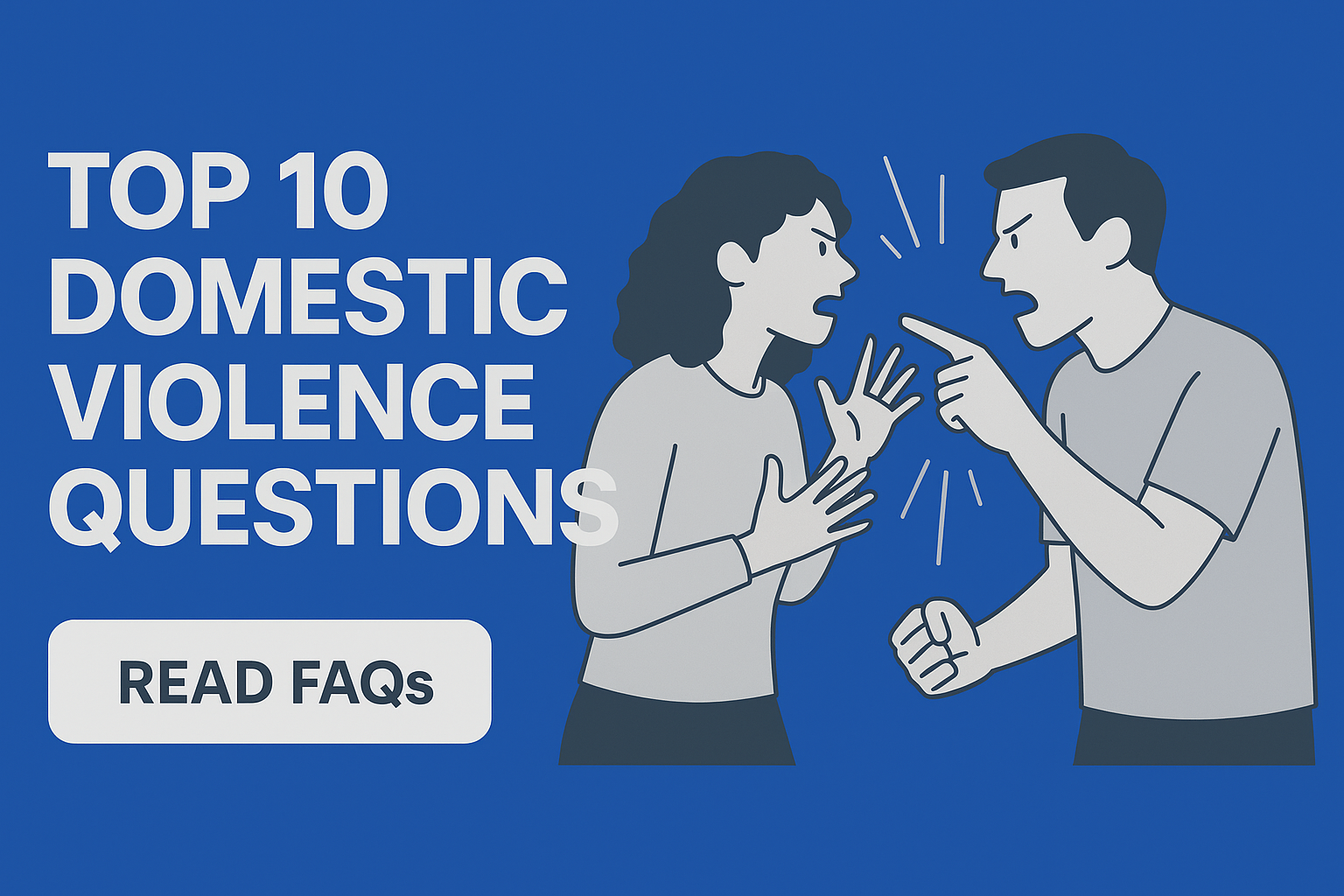If you’re facing domestic violence charges in Missouri, you should speak to a lawyer right away — even if it’s your first offense or the alleged victim doesn’t want to press charges. Whether you’ve been falsely accused, acted in self-defense, or made a mistake you regret — having the right legal representation can make the difference between jail time and getting your life back.
In Missouri, prosecutors can move forward with domestic violence cases whether or not the person involved wants to “drop it.” The stakes are high: you could lose your freedom, your job, or your right to see your kids.
In this guide, we’ll cover:
- What to expect during the legal process
- Why you need a lawyer for a domestic violence case
- What a domestic violence defense lawyer actually does
- Common outcomes and penalties in Missouri cases
- How to get domestic violence charges dropped
- How and when to contact a lawyer for help

What Happens in a Domestic Violence Case in Missouri?
A domestic violence case in Missouri typically starts with an arrest and can move quickly through protective orders, court hearings, negotiations, and possibly a criminal trial — even if the alleged victim doesn’t want to press charges.

Here’s how the process usually unfolds:
1. Arrest and Booking
Police respond to a domestic call and investigate the scene.
If there’s probable cause — especially in alleged assaults — they’ll usually arrest the person they consider the “primary aggressor.”
The accused is booked at the station, and in many cases, held in jail until their first court appearance.
2. First Court Appearance
Within 24–48 hours, the accused appears before a judge to be informed of the charges.
The court may issue a no-contact order or other protective conditions that restrict communication or residence.
Bail may be set, or the person may be released with conditions.
3. Pre-Trial Hearings
If the case moves forward, there may be a preliminary hearing to determine if enough evidence exists to proceed.
An arraignment follows, where the accused enters a formal plea (guilty or not guilty).
Throughout this stage, the accused should consult a lawyer — or risk losing critical opportunities to suppress evidence, reduce charges, or even get the case dismissed entirely.
4. Trial or Resolution
If no plea deal is reached, or the charges aren’t dismissed, the case proceeds to trial.
The prosecution presents evidence, and the defense has the opportunity to challenge it or offer an alternative explanation.
A conviction can result in jail or prison time, fines, probation, and long-term consequences like orders of protection, restrictions on firearm ownership, and a permanent criminal record.
5. Additional Consequences
The court may also order counseling, batterer intervention programs, or supervised visitation.
Protective orders can stay in place for months or years, depending on the case outcome.
Do You Need a Lawyer for a Missouri Domestic Violence Case?
Yes — if you’ve been accused of domestic violence, hiring a lawyer is critical to protect your freedom, your rights, and your future. These cases are prosecuted aggressively, often involve protective orders, and can lead to criminal convictions even when no physical evidence exists.
Here’s why an experienced domestic violence defense attorney is so important:
Early Legal Help Can Change the Outcome
Police reports and no-contact orders happen fast. A lawyer can push back before the case snowballs.
Your attorney can fight for pretrial release, challenge unlawful procedures, and negotiate with prosecutors while the case is still forming.
They Know How to Handle False or Exaggerated Allegations
Domestic violence cases can be fueled by emotions, breakups, or custody disputes. A skilled attorney knows how to expose unreliable testimony and incomplete investigations.
You May Not Realize How Much Is at Stake
Even if charges are dropped or reduced, a domestic violence arrest can affect employment, housing, and parental rights.
Protective orders may restrict where you live or whether you can see your kids — even if you are not convicted in the criminal case.
The Court System Is Not Set Up for DIY Defense
Without a lawyer, you risk missing legal defenses, overlooking procedural errors, or accepting an unfair plea deal.
A good lawyer for a domestic violence case’s focus isn’t just defending the charges. They protect your reputation, guide you through court, and prioritize your long-term future.
What Are the Penalties for Domestic Violence in Missouri?
Domestic violence penalties in Missouri range from misdemeanors to serious felonies — and can include jail time, fines, protective orders, and a permanent criminal record.
The punishment depends on the specific charge, your prior history, and whether there were aggravating factors like injury, use of a weapon, or violation of a protection order.

Domestic Violence Charges and Penalties in Missouri
- Domestic Assault – 1st Degree (Class B or A Felony)
- What it involves: Attempting to kill or knowingly causing (or attempting to cause) serious physical injury to a domestic victim.
- Penalty:
- Class B felony: 5–15 years in prison.
- Class A felony (if serious physical injury occurred): 10–30 years or life in prison.
- Domestic Assault – 2nd Degree (Class C Felony)
- What it involves:
- Knowingly causing physical injury by use of a deadly weapon or dangerous instrument
- Recklessly causing serious physical injury
- Recklessly causing injury by choking or strangling
- Penalty: Up to 7 years in prison and/or fines.
- What it involves:
- Domestic Assault – 3rd Degree (Class E Felony)
- What it involves:
- Intentionally causing physical injury to a domestic victim
- Penalty: Up to 4 years in prison and/or a $10,000 fine.
- What it involves:
- Domestic Assault – 4th Degree
- Class A Misdemeanor (default):
- What it involves: Attempting to cause or recklessly causing physical injury, pain, or illness; placing a victim in apprehension of harm; or isolating or threatening a domestic victim.
- Penalty: Up to 1 year in jail and/or up to a $2,000 fine.
- Class E Felony (if the defendant has a prior domestic assault conviction):
- Penalty: Up to 4 years in prison.
- Class A Misdemeanor (default):
- Violation of an Order of Protection
- Class A Misdemeanor (first offense):
- What it involves: Knowingly violating a court-issued full order of protection (e.g., contacting the protected person, showing up at their home, etc.).
- Penalty: Up to 1 year in jail and/or up to a $2,000 fine.
- Class E Felony (repeat offense within 5 years involving same victim):
- Penalty: Up to 4 years in prison.
- Class A Misdemeanor (first offense):
What Does a Missouri Lawyer for Domestic Violence Case Actually Do?
A domestic violence defense lawyer guides you through the legal system, protects your rights, and works to minimize or eliminate the consequences you face. From the moment you’re accused, their job is to challenge the government’s case and ensure you’re treated fairly.
Here’s what that typically involves:
- Explaining the Charges and Legal Process
Your lawyer will walk you through what the charges mean, potential penalties, and the steps ahead — from arraignment to possible trial.
- Investigating the Incident
They’ll analyze the police report, review the 911 call, assess injuries (or lack thereof), and look for inconsistencies in witness statements or video evidence.
- Building a Strategic Defense
Depending on the facts, a lawyer may pursue self-defense, false accusation, lack of intent, or insufficient evidence. Even in clear-cut cases, they can negotiate for reduced charges or diversion programs.
- Handling Prosecutors and Court
A domestic violence lawyer deals with the prosecutor on your behalf, files motions to suppress evidence, and represents you at every court appearance so you don’t face the judge alone.
- Protecting Long-Term Interests
Beyond jail time, domestic violence charges can affect your job, child custody, immigration status, and gun rights. Your lawyer’s job is to help preserve your future, not just defend you in court.
Can Domestic Violence Charges Be Dropped If the Alleged Victim Doesn’t Want to Press Charges?
In Missouri, the prosecutor (not the alleged victim) decides whether to move forward with a domestic violence case. Even if the victim asks to “drop the charges,” the state can continue prosecution if they believe there’s enough evidence.

However, a skilled domestic violence defense lawyer can:
- Highlight weaknesses in the case, especially if the alleged victim is unwilling to cooperate or testifies inconsistently.
- Challenge the admissibility of prior statements, 911 calls, or hearsay.
- Negotiate with the prosecutor for reduced or dismissed charges if the evidence doesn’t hold up without the victim’s full participation.
- File motions to suppress evidence gathered improperly or without cause.
Bottom line: The victim can’t unilaterally drop charges, but their stance can influence the outcome — and an attorney knows how to leverage that effectively.
What Are the Possible Outcomes in a Domestic Violence Case in Missouri?
The outcome of your case depends on the charges, the facts, your prior history, and the strategy your lawyer builds — but most domestic violence cases resolve in one of these ways:
- Case Dismissal: Due to lack of evidence, improper police conduct, or an uncooperative witness.
- Diversion Program: For first-time offenders, completing counseling or classes may lead to dismissal or no conviction.
- Plea Bargain: Charges are reduced in exchange for a guilty plea, often avoiding jail or a permanent record.
- Trial / Not Guilty Verdict: If you fight the charges and win, your record stays clean.
- Conviction and Sentencing: This can include jail, probation, protective orders, fines, counseling, or firearms restrictions.
Even seemingly minor penalties can have long-term consequences. That’s why your lawyer’s ability to negotiate, investigate, and challenge is so important.
When to Call a Lawyer for Your Domestic Violence Case (and What Happens When You Do)
You should contact a domestic violence defense lawyer as soon as possible — before you speak to police or appear in court. Early legal advice can protect you from saying the wrong thing, violating a no-contact order, or missing strategic options. Never talk to law enforcement without an attorney present.
Here’s what happens when you call Combs Waterkotte:
- We listen — confidentially and without judgment.
- We explain your charges, what to expect, and what’s at stake.
- We develop a strategy right away, whether that means talking to prosecutors, gathering evidence, or appearing at your arraignment.
- We stay by your side, so you’re never navigating the system alone.
Contact us today or call (314) 900-HELP for a free case review. We defend domestic violence charges across Missouri — and we’re ready to fight for you.







